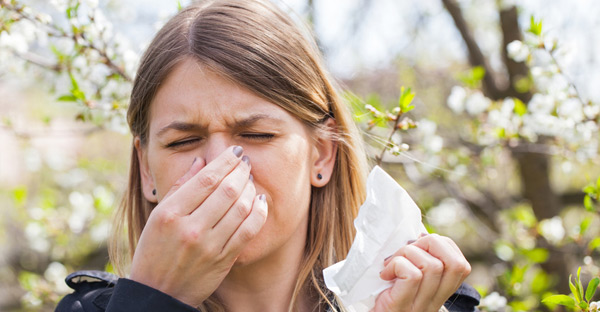Doctor Bruce Irwin from the “American family care” discusses how changing your diet and focusing on anti-inflammatory foods can help reduce seasonal allergies symptoms.
How Changing Your Diet May Improve Seasonal Allergies
We’re in the thick of pollen season, where everything from vehicles to patio furniture is painted a bright yellow, signaling the sign of spring and misery for seasonal allergy sufferers across the country. Itchy eyes, excessive sneezing, mucus buildup, and congestion are just a few allergy symptoms that have so many of us pleading for any ounce of relief. Luckily, there are simple and natural ways, like changing your eating habits, that help treat and ease the pain of seasonal allergies.
It’s true— certain foods can in fact make your seasonal allergies worse. Alcohol, peanuts, sugar, processed foods, wheat, chocolate, and even your morning cup of coffee are known culprits that act as hay fever catalysts. People also find relief in limiting foods that cause mucus production, such as conventional dairy products and gluten. Additionally, if you are aware of a ragweed allergy avoid melons, bananas, cucumbers, and sunflower seeds, as they can cause allergic reactions in your body and worsen seasonal allergies.
Now, we aren’t saying eliminate all of these foods completely, because everyone needs a sugar fix after a hard day. Just be mindful of your intake and how it may affect your seasonal allergies.
Diet Ideas for Seasonal Allergies
While the list of foods above may have you considering clearing out half your pantry, there are plenty of foods to say YES to this season!
Spicy Foods
If you’re suffering from congestion, incorporating spicy dishes like flavorful curry, can help thin out mucus. Cayenne pepper, garlic, ginger, and cinnamon are your culinary friends! Ginger helps break down toxins in your system and is a great sinus decongestant.
Fresh, Organic Vegetables
Getting your recommended intake of colorful vegetables and clean proteins is always recommended, but especially important during allergy season. Choose nutrient rich veggies like carrots, yams, cabbage, beets, or swiss chard, which is high in Quercetin— a natural compound that fights hay fever and inflammation.
Local Raw Honey
A spoon full of local honey can help relieve watery eyes, congestion and most allergy symptoms because it contains the very pollen your seasonal allergies stem from.
Probiotic-Rich Foods
Sauerkraut, kimchi, and kombucha are probiotic-rich foods that increase energy levels, improve digestion and harbor immune boosting powers.
Liquids
Both bone broth and apple cider vinegar help break up mucus, ease respiratory issues, reduce inflammation, and boost immunity!
Pineapple
While pineapple is delicious all year long, it just seems to taste better when weather heats up. Pineapple is bursting with necessary vitamins and enzymes that help reduce reactions to seasonal allergies. Don’t neglect the pineapples core, as it has the highest concentration of nutrients!











